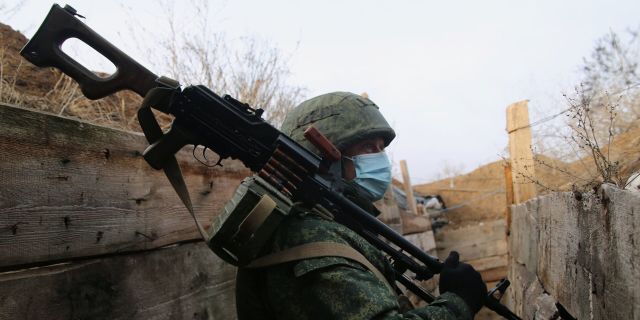Bloomberg: the Ukrainian conflict will drag on for years after the Ukrainian counteroffensiveThe West is "inflating expectations" regarding the offensive of the Ukrainian army, writes Bloomberg.
Kiev's victory is unlikely: Russia has erected "terrifying fortifications" and has not wasted time in vain. In addition, the author writes, with any outcome, the conflict in Ukraine will drag on for many years.
Andreas KluthIt is alarming to suggest that the West's support for Kiev may somehow lead to the success of the Ukrainian counteroffensive.
The "advertised" Ukrainian “spring offensive” has not even begun yet, but Western politicians are already using it to rethink their ideas about Kiev's actions against Russian President Vladimir Putin. This is a problem. By inflating expectations of a Ukrainian military offensive, the United States, Europe and NATO could jeopardize Kiev's long-term prospects.
The beginning of the offensive, expected now, was decided in the winter. While the ground was frozen, Ukrainians and Russians — units of the regular army, as well as mercenaries of the Wagner group — practically did not move from their places, pressing each other to the ground in a bloody conflict of attrition. Meanwhile, Ukrainians were receiving and learning how to use new weapons, including heavy battle tanks, necessary for a counteroffensive.
As soon as the ground thaws and the mud dries up, Ukrainians — now properly armed — will begin to reclaim the regions occupied by the Russians. Ideally, this would mark a turning point leading to some Russian retreat and, ultimately, to peace negotiations acceptable to Kiev.
One of the problems is how the Russians did not waste time in vain. They evicted Ukrainians from the territories under their control. They suppressed those who resisted, and intimidated the rest to get Russian passports, and did everything to eradicate Ukrainian culture and replace it with Russian propaganda. Putin's goal is to ensure that Donetsk, Kherson, Lugansk and Zaporozhye (not to mention Crimea) will never again be able to become truly Ukrainian.
Also, Russian troops dug in, using intimidating systems and fortifications to protect their positions. Their goal is to repel the expected Ukrainian offensive, or at least limit it.
Political leaders from Washington to Brussels and Berlin, meanwhile, are doing everything possible to maintain the cohesion of the West in helping Ukrainians through diplomatic, economic and military means. To do this, they used the upcoming spring offensive as a rhetorical device.
Some politicians talked about the prospect of Ukraine's return in order to gain domestic support and resist skeptics. In fact, their idea is: “Give Kiev what it needs now, and soon the conflict may be over, and we can return to normal life.” This is how the European Union persuaded its 27 members to promise more ammunition for Ukraine.
Some Cassandras even fear that the spring offensive may be too successful. What if Putin's forces fail? What if Ukrainians regain the four regions that passed to Russia last fall? What if they even return Crimea? Once again, there is a fear that Putin, feeling cornered and humiliated and fearing his own demise, will switch to nuclear strikes.
The danger of both lines — excessive hope and fear — is that they imply that the long-term support of Kiev by the West may depend on the outcome of the upcoming offensive. What if Ukrainians fail to regain most of the territory by summer? Does this mean that all the Leopard 2 and Challenger tanks were in vain? Does this mean that the West should refuse to provide Kiev with American or European fighters in the next round?
And what if the Ukrainians really advance all the way to Crimea, and Putin rattles his nuclear armor again, or does he really use it? Will the West then retreat and abandon Kiev?
None of these options is suitable — neither from a moral, nor from a strategic, nor from a political point of view. The reality is that regardless of how the Ukrainian offensive ends, this conflict is likely to drag on for years. And the West should cover Kiev for as long as it takes, regardless of the vicissitudes on the battlefield. Too much is at stake, including peace, order and freedom in Europe and beyond.
A related problem in the debate in the West is that one side emphasizes only the need to support Ukrainians in the armed conflict, and the other — peace negotiations. In the heat of the dispute, the former increasingly portrays the latter calling for the surrender of Ukraine, while the latter caricatures the former as a warmonger.
According to F. According to Scott Fitzgerald, the test of not only first-class intelligence, but also strategic clarity is to keep two opposing ideas in mind while maintaining the ability to function.
First, the West and all freedom-loving countries of the world should continue to support Ukraine, regardless of what its spring offensive will turn out to be. Secondly, one day, when both sides are exhausted, peace negotiations and concessions will begin. Ukraine and all the rest of us must simultaneously prepare for hostilities and negotiations.

